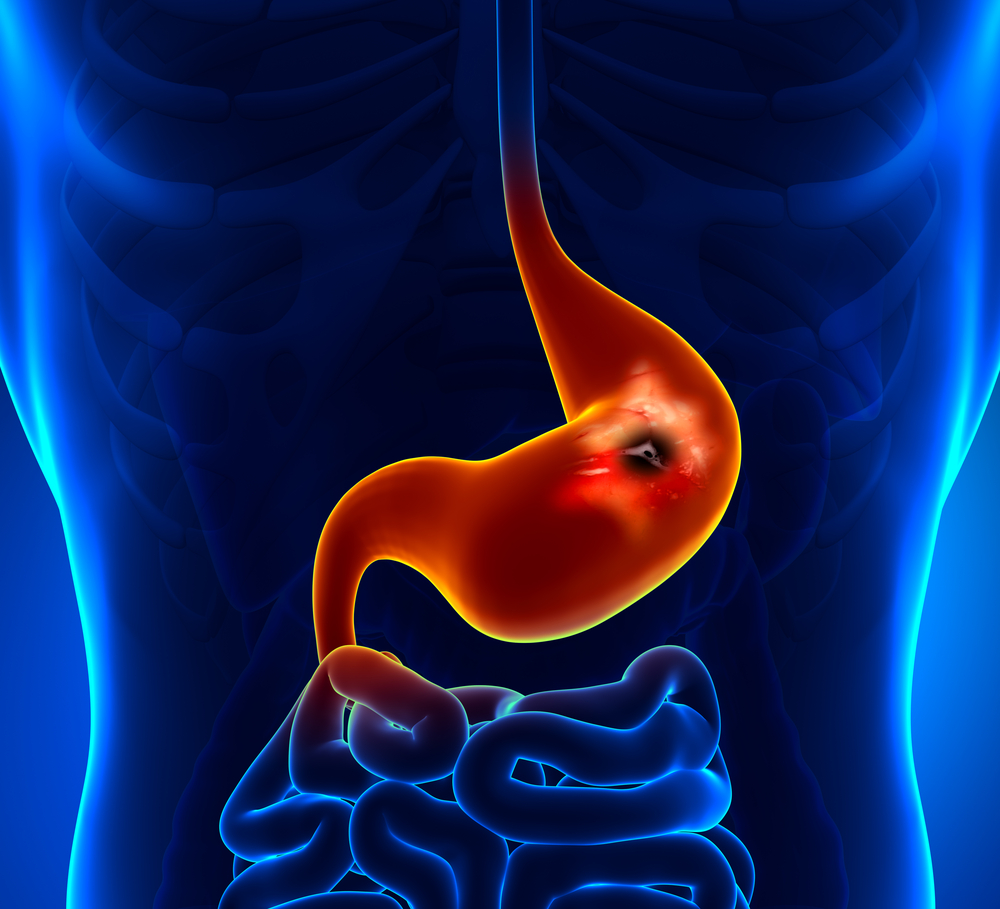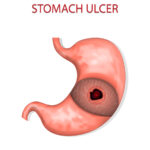Our Blog
Does Acid Reflux Cause Stomach Ulcers?

Because both acid reflux and stomach ulcers are associated with a burning sensation, they are often confused. However, they are two very different issues within the body and often require different plans for treatment. But, with similar symptoms, can one actually lead to the other? More specifically, does acid reflux cause stomach ulcers?
What is a Stomach Ulcer?
First, it’s important to know what a stomach ulcer actually is. An ulcer is a hole or sore that forms in the lining of the stomach. While several individuals with ulcers experience no symptoms at all, many do.
Symptoms may include burning pain in the upper abdomen that reaches all the way to the back, heartburn, nausea, bloating, a feeling of fullness, or vomiting. Severe symptoms can include vomiting blood, unexplained weight loss, black, tarry stools, appetite changes, feeling faint, and even trouble breathing. With symptoms like these, if an ulcer is left untreated, it can become dangerous.
Does Acid Reflux Cause Stomach Ulcers?
While a little indigestion may not be an issue, chronic reflux or GERD (gastroesophageal reflux disease) can cause and worsen ulcers. Specifically, acid reflux is when stomach acid flows back up into the esophagus and can be caused by a hiatal hernia, (where the diaphram prevents the stomach from closing fully and hence allows stomach acid to flow back or reflux into the esophagus). Additionally, acid reflux can be caused by certain trigger foods, lifestyle factors, such as smoking or being overweight, or when foods do not digest properly and begin to ferment and produce excess gas buildup within the stomach.
An ulcer may result because a frequent backward flow of acid can deteriorate the esophagus and stomach lining. As many as 50% of individuals with ulcers also have chronic acid reflux. While GERD may contribute to ulcers, an ulcer will not cause acid reflux.
Primary Causes
Though GERD can lead to an ulcer, it is not a primary factor of this condition. For the most part, ulcers are the result of one of two conditions. The first being an infection with the bacterium Helicobacter pylori or H. pylori which can cause inflammation of the lining of the gut.
The second most frequent cause of ulcers is the long-term use of NSAIDs. NSAIDs or non-steroidal anti-inflammatory drugs are medications like ibuprofen and aspirin.
Treatments for a Stomach Ulcer
While this condition is certainly uncomfortable, the good news is that relief can be found through a natural approach. With simple changes to diet and lifestyle, tackle the pain and allow your body to heal from within. These changes include:
- Stopping smoking – Smoking can increase your chances of experiencing this condition and can disrupt healing.
- Limit your intake of NSAIDs – While these may provide relief temporarily, long-term use can increase your chances of getting this condition and they too inhibit the healing process.
- Reduce alcohol – Reducing or cutting back on your alcohol intake will assist in the healing process.
- Reduce stress – Stress too is a factor that prolongs the healing of ulcers
- Change your diet – There are several foods that are naturally healing when it comes to ulcers. This may be because they assist in pain management or may suppress and inhibit the growth of the bacterium H. pylori. These foods include garlic, honey, yogurt, teas, herbs, fruits (specifically berries like cranberries, blueberries, strawberries, and elderberries, as well as apples and red grapes), vegetables, legumes, mastic (like mastic gum), deglycyrrhizinated licorice, and even food items like dark chocolate, flaxseed, and black olives.
Get the Support You Need
If you suspect that you have an ulcer, don’t suffer in silence anymore. Reach out to The Gut Authority in Daphne, Alabama, today! We work with clients, from surrounding areas including Pensacola, Florida, to get to the root of their ailments. Our goal is to help create an individualized plan that may include a deeper understanding of your body, as well as how changes to your diet and lifestyle can impact your body’s natural healing ability. Act now to find the relief you need to get on with living your best life!




